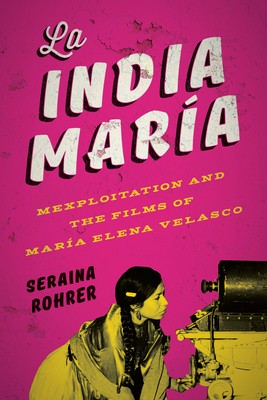
- We will send in 10–14 business days.
- Author: Seraina Rohrer
- Publisher: University of Texas Press
- Year: 2018
- Pages: 232
- ISBN-10: 1477313443
- ISBN-13: 9781477313442
- Format: 15.2 x 22.9 x 1.8 cm, kieti viršeliai
- Language: English
- SAVE -10% with code: EXTRA
Reviews
Description
La India MarÃa--a humble and stubborn indigenous Mexican woman--is one of the most popular characters of the Mexican stage, television, and film. Created and portrayed by MarÃa Elena Velasco, La India MarÃa has delighted audiences since the late 1960s with slapstick humor that slyly critiques discrimination and the powerful. At the same time, however, many critics have derided the iconic figure as a racist depiction of a negative stereotype and dismissed the India MarÃa films as exploitation cinema unworthy of serious attention. By contrast, La India MarÃa builds a convincing case for MarÃa Elena Velasco as an artist whose work as a director and producer--rare for women in Mexican cinema--has been widely and unjustly overlooked.
Drawing on extensive interviews with Velasco, her family, and film industry professionals, as well as on archival research, Seraina Rohrer offers the first full account of Velasco's life; her portrayal of La India MarÃa in vaudeville, television, and sixteen feature film comedies, including Ni de aquÃ, ni de allá [Neither here, nor there]; and her controversial reception in Mexico and the United States. Rohrer traces the films' financing, production, and distribution, as well as censorship practices of the period, and compares them to other Mexploitation films produced at the same time. Adding a new chapter to the history of a much-understudied period of Mexican cinema commonly referred to as "la crisis," this pioneering research enriches our appreciation of Mexploitation films.
EXTRA 10 % discount with code: EXTRA
The promotion ends in 21d.13:52:32
The discount code is valid when purchasing from 10 €. Discounts do not stack.
- Author: Seraina Rohrer
- Publisher: University of Texas Press
- Year: 2018
- Pages: 232
- ISBN-10: 1477313443
- ISBN-13: 9781477313442
- Format: 15.2 x 22.9 x 1.8 cm, kieti viršeliai
- Language: English English
La India MarÃa--a humble and stubborn indigenous Mexican woman--is one of the most popular characters of the Mexican stage, television, and film. Created and portrayed by MarÃa Elena Velasco, La India MarÃa has delighted audiences since the late 1960s with slapstick humor that slyly critiques discrimination and the powerful. At the same time, however, many critics have derided the iconic figure as a racist depiction of a negative stereotype and dismissed the India MarÃa films as exploitation cinema unworthy of serious attention. By contrast, La India MarÃa builds a convincing case for MarÃa Elena Velasco as an artist whose work as a director and producer--rare for women in Mexican cinema--has been widely and unjustly overlooked.
Drawing on extensive interviews with Velasco, her family, and film industry professionals, as well as on archival research, Seraina Rohrer offers the first full account of Velasco's life; her portrayal of La India MarÃa in vaudeville, television, and sixteen feature film comedies, including Ni de aquÃ, ni de allá [Neither here, nor there]; and her controversial reception in Mexico and the United States. Rohrer traces the films' financing, production, and distribution, as well as censorship practices of the period, and compares them to other Mexploitation films produced at the same time. Adding a new chapter to the history of a much-understudied period of Mexican cinema commonly referred to as "la crisis," this pioneering research enriches our appreciation of Mexploitation films.


Reviews